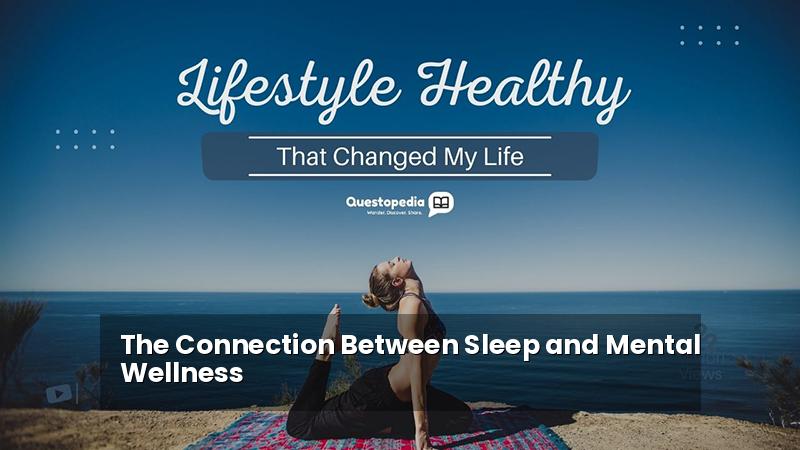The Connection Between Sleep and Mental Wellness
In today’s fast-paced world, it’s easy to overlook the fundamental connection between our physical and mental well-being. One of the most crucial, yet often neglected, elements of a healthy life is sleep. This article delves into the intricate relationship between sleep and mental wellness, exploring how adequate sleep can positively impact your mood, cognitive function, and overall mental health, while conversely, how sleep deprivation can contribute to mental health challenges.
Understanding the Sleep-Mental Wellness Nexus
The connection between sleep and mental well-being is a two-way street. Poor sleep can exacerbate existing mental health conditions and even trigger new ones. Conversely, mental health issues like anxiety and depression can significantly disrupt sleep patterns, creating a vicious cycle that’s difficult to break. Understanding this bidirectional relationship is the first step towards prioritizing both sleep and mental wellness.
The Science Behind the Connection
During sleep, our brains perform essential functions, including consolidating memories, clearing out toxins, and regulating hormones. When we are sleep-deprived, these processes are disrupted, leading to a cascade of negative effects. For example, lack of sleep impacts the amygdala, the brain’s emotional center, making us more reactive and irritable. It also affects the prefrontal cortex, which is responsible for rational thought and decision-making, leading to impaired judgment and focus.
How Sleep Impacts Specific Mental Health Conditions
The influence of sleep extends to various mental health conditions. Here’s a closer look at some specific examples:
Sleep and Depression
Insomnia is a common symptom of depression, and studies have shown that poor sleep can increase the risk of developing depressive disorders. Sufficient sleep, conversely, can play a protective role. Improving sleep quality is often a crucial component of depression treatment plans. Learn more about depression at reputable organizations like the National Institute of Mental Health (NIMH).
Sleep and Anxiety
Anxiety can manifest as racing thoughts and difficulty relaxing, making it hard to fall asleep or stay asleep. This sleep deprivation then worsens anxiety symptoms, creating a cycle of stress and sleeplessness. Techniques like meditation and deep breathing exercises can help manage anxiety and improve sleep. For more information on managing anxiety, visit the Anxiety & Depression Association of America (ADAA).
Sleep and Bipolar Disorder
Sleep disturbances are a hallmark of bipolar disorder. During manic episodes, individuals may experience a decreased need for sleep, while depressive episodes can be characterized by insomnia or excessive sleepiness. Maintaining a regular sleep schedule is essential for managing bipolar disorder symptoms. Consulting with a mental health professional is crucial for developing an effective treatment plan. Consider checking out articles on related topics here.
Sleep and ADHD
Children and adults with ADHD often struggle with sleep problems, including difficulty falling asleep, restless sleep, and daytime sleepiness. These sleep issues can exacerbate ADHD symptoms like inattention and impulsivity. Improving sleep hygiene can significantly benefit individuals with ADHD. You can find more details on ADHD at the CDC Website.
Tips for Improving Sleep and Mental Wellness
Fortunately, there are several strategies you can implement to improve your sleep and, consequently, enhance your mental well-being:
- Establish a Regular Sleep Schedule: Go to bed and wake up around the same time each day, even on weekends, to regulate your body’s natural sleep-wake cycle.
- Create a Relaxing Bedtime Routine: Engage in calming activities like reading, taking a warm bath, or listening to soothing music before bed.
- Optimize Your Sleep Environment: Make sure your bedroom is dark, quiet, and cool. Consider using blackout curtains, earplugs, or a white noise machine.
- Limit Screen Time Before Bed: The blue light emitted from electronic devices can interfere with melatonin production, making it harder to fall asleep. Avoid using phones, tablets, and computers at least an hour before bedtime.
- Avoid Caffeine and Alcohol Before Bed: These substances can disrupt sleep patterns and worsen anxiety.
- Exercise Regularly: Regular physical activity can improve sleep quality, but avoid exercising too close to bedtime.
- Practice Relaxation Techniques: Techniques like meditation, deep breathing, and progressive muscle relaxation can help reduce stress and promote sleep.
When to Seek Professional Help
If you’re consistently struggling with sleep problems and experiencing symptoms of mental health issues, it’s essential to seek professional help. A doctor or mental health professional can assess your situation, diagnose any underlying conditions, and recommend appropriate treatment options, such as therapy, medication, or sleep studies. Don’t hesitate to reach out – your mental health is worth it. Check out this article to learn more about mental health resources.
Conclusion
The connection between sleep and mental wellness is undeniable. Prioritizing sleep is not a luxury; it’s a necessity for maintaining optimal mental health. By implementing healthy sleep habits and seeking professional help when needed, you can significantly improve your mood, cognitive function, and overall quality of life. Remember to listen to your body, prioritize rest, and invest in your well-being. Remember, you can find more useful information on our homepage.






